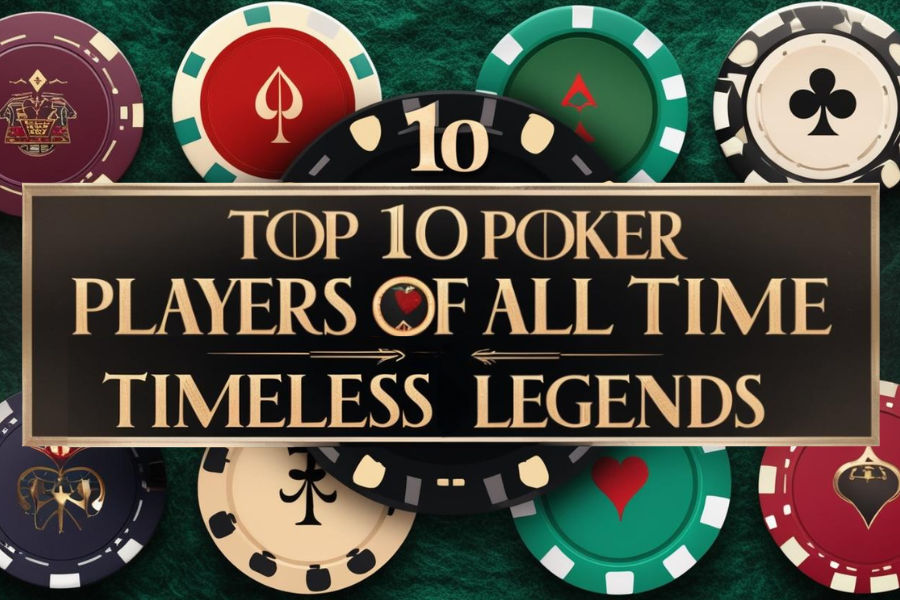Poker is not just any game of luck but rather a competition of one’s skill, psychological knowledge, and stamina. Throughout the years of the existence of poker as a discipline, we have experienced the emergence of players who have single-handedly changed the scope of the game’s existence, and their influence has surpassed borders, reaching the lives of millions worldwide. They etched their unique legacy on the chronicles of poker history with meticulous care and strategic approaches.
In this article, we’ll look at the top 10 poker players of all time, based on career achievements, tournament wins, contributions to the game, and legendary status. Whether you’re a seasoned pro or a newcomer, these names are synonymous with greatness.
1. Phil Hellmuth – The Poker Brat
In World Series of Poker history, no one comes close to draping 17 bracelets around his wrists like Phil Hellmuth did. As easily recognizable as the man himself is his nickname, “The Poker Brat,” which derives from his propensity to make outrageous statements and turbulent emotions.
- WSOP Bracelets: 17
- Main Event Win: 1989
- Lifetime Winnings: $25M+
Phill Hellmuth's Strategy:
The Phil Ivey way basically revolves around unpredictability, opponent reading, and instinctive play. Rather than adhering to a fixed set of rules, he customizes his play contingent upon his read on the individual involved through past patterns, fine tells, and a finger-snap decision. He strategically integrates bluffs into a mixture of means, not just for the sake of winning hands, but for him to use how they perceive him to net greater profits. He is a truly metagame master, setting traps and turning the tables with extravagant plays in order to entice future actions. Phil Ivey moves far away from the charts and focuses mostly on thinking and manipulating his opponents through the present moment.
2. Doyle Brunson – Texas Dolly
The late Doyle Brunson is a true pioneer of the game. With over five decades in professional poker, Brunson was a two-time WSOP Main Event champion and author of the legendary poker strategy book Super/System.
- WSOP Bracelets: 10
- Main Event Wins: 1976, 1977
- Lifetime Winnings: $6M+
Doyle Brunson' Strategy:
Doyle Brunson’s strategy in a nutshell: play tight and aggressive and only enter pots with strong hands, but when you do, play them with confidence. Over time, this builds a solid, trustworthy image at the table, which you can then exploit by making bold moves that opponents are more likely to believe, even when you're bluffing. It’s all about discipline, timing, and using your table image to outthink your opponents.
3. Daniel Negreanu – Kid Poker
Daniel Negreanu is one of the most recognized poker players of all time, with a unique ability to read opponents and entertain fans. His table talk and personality made him a fan favorite.
- WSOP Bracelets: 6
- Lifetime Winnings: $50M+
- Achievements: GPI Player of the Decade (2004–2013)
Daniel Negreanu's Strategy:
Daniel Negreanu’s approach for beginners is rooted in disciplined, purpose-driven play. He advises against bluffing, especially for new players, and emphasizes playing tight in the early stages of a tournament to avoid unnecessary risks. Building a tight table image is strategic in itself, as it can later be leveraged to win pots when opponents assume you’re only playing premium hands. He also stresses the importance of knowing why you’re at the table to make informed decisions for the long-term growth in the game.
4. Phil Ivey – The Tiger Woods of Poker
Many pros consider Phil Ivey the most talented poker player in the world. His quiet demeanor hides a ruthless ability to dominate in any format such as cash games, tournaments, live or online.
- WSOP Bracelets: 10
- Lifetime Winnings: $30M+
- Reputation: One of the most feared opponents in high-stakes poker
Phil Ivey's Strategy:
Phil Ivey’s strategy is all about staying unpredictable, reading opponents deeply, and trusting his instincts. He doesn’t rely on rigid rules, and instead, he adjusts his play based on who he’s up against, using past behaviors and subtle tells to make decisions. He mixes in bluffs strategically, not just to win hands, but to shape how others see him and get paid off later. Ivey’s a master of the metagame, setting traps and making bold plays to influence future action. At the core, his game is less about following charts and more about outthinking and outmaneuvering his opponents in the moment.
5. Johnny Chan – Back-to-Back Champion
Johnny Chan made history by winning back-to-back WSOP Main Events in 1987 and 1988. He almost won a third in 1989, finishing second to Phil Hellmuth.
- WSOP Bracelets: 10
- Lifetime Winnings: $8M+
- Pop Culture Moment: Appeared in Rounders (1998)
Johnny Chan's Strategy:
Johnny Chan is famous for his poker strategy of disciplined aggression, awesome hand reading, and psychological insight. He selects his hands carefully at the start and plays them aggressively, meaning he enters pots with a really good range. His opponent reading is clearly illustrated in hands where he makes unconventional plays based only on live reads, like folding strong hands when he senses strength from adversaries. He sure knows how to read them; he capitalizes on their perceptions by the way he manipulates his betting patterns to fit into their expectations. Strategic aggression combined with sharp psychological awareness is what has led to this genius being successful at a poker table.
6. Stu Ungar – The Natural
Stu Ungar was a poker prodigy with unmatched natural talent. He remains the only player to win the WSOP Main Event three times (including once unofficially).
- WSOP Bracelets: 5
- Main Event Wins: 1980, 1981, 1997
- Lifetime Winnings: $30M+
Stu Ungar's Strategy:
Stu Ungar's poker strategy was defined by his exceptional analytical skills and fearless aggression. He had a very particular and uncanny ability to read his opponents, often revealing the hands in a few instances and allowing him to make the most precise decisions. His constantly aggressive betting style made his opponents stay under pressure all the time and put them in difficult situations where they could be trapped and used against their mistakes. A combination of profound psychological understanding and mathematical precision in thinking was what allowed him to continue winning at tables.
7. Erik Seidel – The Quiet Assassin
Erik Seidel’s name may not be as flashy, but his record speaks volumes. With nearly $43 million in live tournament winnings, he has proven himself in every poker era.
- WSOP Bracelets: 9
- Lifetime Winnings: $43M+
- Cameo: Featured in Rounders losing to Johnny Chan in the final scene
Erik Seidel's Strategy:
Erik Seidel has a unique way of combining balance with adaptability and clever psychological strategies. He knows just the right moments to engage in conversation at the table to throw his opponents off, yet he’s always prepared to switch things up based on the flow of the game. With a good solid foundation, he is also capable of modern aggression, defending wider ranges, and pressuring when it feels just right. However, what stands out is his ability to read players and accurately make huge calls, analyzing patterns and behavior. It is a very calm, calculated way that somehow counters whatever opponent is left in the game.
8. Chip Reese – The Best Cash Game Player
David “Chip” Reese was considered the greatest cash game player of his generation. Though he didn’t chase tournament fame, his skill was legendary among peers.
- WSOP Bracelets: 3
- Legacy Achievement: Won the inaugural $50K H.O.R.S.E. event in 2006
- Lifetime Winnings: $3.8M+
Chip Reese's Strategy:
He had that pot-of-gold poker strategy that matches mathematics and psychology with well-controlled aggression. He used his deep knowledge of probabilities and odds to get set to make tactical moves, which often threw off opponents who were intuitive players. But while the betting style appeared aggressive to others, it was actually meant to put pressure on an opponent and corner him into a tough situation. This skilled reporting of mathematics and making the right move have effectively combined to earn him a well-deserved name as a versatile, formidable player.
9. Antonio Esfandiari – The Magician
Antonio Esfandiari went from street magician to poker superstar. He’s best known for winning the biggest single prize in poker history: $18.3 million at the 2012 Big One for One Drop.
- WSOP Bracelets: 3
- Lifetime Winnings: $27M+
- Nickname: “The Magician”
Antonio Esfandiari's Strategy:
Antonio Esfandiari's system of poker relies on disciplined play, unique hand reading, and adaptability to world-class opponents. He tends to play conservatively against aggressive opponents and plays his top hands in a way that induces bluffs from them to maximize his suffering. Balancing his decisions based on hand-reading skills and coming up with new strategies in an instant is the way he plays. Esfandiari's simple style, without much complication, has definitely paid off in the high-stakes arena during his matches against some of the best, Phil Ivey among them.
10. Chris Moneymaker – The Everyman Legend
Chris Moneymaker was the spark that lit the poker boom. In 2003, this amateur accountant won the WSOP Main Event after qualifying online for just $39.
- WSOP Bracelets: 1
- Main Event Win: 2003
- Lifetime Winnings: $3.9M+
Chris Moneymaker' Strategy:
Antonio Esfandiari's poker strategy is characterized by a blend of disciplined play, psychological acumen, and adaptability. He often employs a tight approach, especially when facing aggressive opponents, choosing to play premium hands passively to induce bluffs and maximize value. Esfandiari's ability to accurately assess opponents' holdings allows him to make informed decisions and strategic adjustments during hands. Playing "fake hands" face up is an excellent method to start, as Moneymaker says, after introducing the fundamentals (blinds and antes, order of play, etc.). His straightforward playstyle, avoiding unnecessary complexity, has proven effective in high-stakes scenarios, including hands against renowned players like Phil Ivey.
Honorable Mentions
While they didn’t crack the top 10, several poker players deserve recognition:
- Barry Greenstein – “The Robin Hood of Poker”
- Vanessa Selbst – Most successful female poker player in history
- Tom Dwan – High-stakes online phenom
- Jason Koon – Crushing modern high roller circuits
- Fedor Holz – Young poker prodigy with $40M+ in winnings
Are You Ready to Make Your Mark?
Many poker players have changed the face of the game forever with their legendary triumphs, unforgettable moments, and legacy. From Hellmuth's fiery tempestuousness, Ivey's razor-edged precision, to Moneymaker's unbelievable underdog journey, one thing is certain: poker would not be what it is today without these icons.








